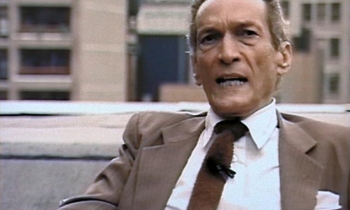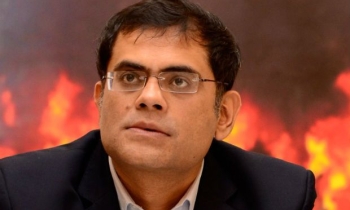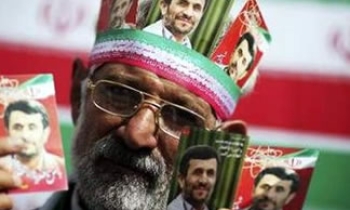During last month’s ministerial meeting of the World Trade Organisation (WTO) in Hong Kong, an estimated 3,000 journalists filed a steady stream of stories highlighting diplomatic clashes between developed and developing countries over the rules that govern world trade.

But this rich-poor gap plagues the world of journalism too - a sad truth encapsulated by an incident I witnessed on the last day of the summit.
His final piece-to-camera wrapped up, a well-known British television journalist decided to take a leisurely walk through the sprawling media centre, quiet satisfaction written all over his face.
Having engaged millions of viewers with his often-incisive reports on the trade talks, he had good reason to be pleased. It was a case of another day, another international meeting, another job well done’.
Just yards from him, a young Bangladeshi television journalist offered a contrasting sight - he was desperately trying to capture reactions to the ministerial statement before the summit wound up.
Shakil Ahmed (pictured) had none of the basic infrastructure and human support taken for granted by his western counterparts. Indeed, he was hampered by the absence of not only a cameraman, but also a camera - fundamental problems, one would think, for a television reporter.
Amazingly, as the British journalist continued on his stroll, Ahmed managed to interview an anti-globalisation campaigner... on a 5 megapixel Sony digital camera, the kind that many of us take on holiday.
He was forced to shoot the interview in several instalments (digital cameras have a filming time of just a few minutes), before editing the footage on his laptop and emailing it to his editor in Dhaka to make the night’s news bulletin.
"So, what do you think of my email television journalism?" Ahmed asked, shrugging off any hint of a challenge.

It was a truly astonishing display of dogged newsgathering - and also one that exposed the other inequality lying at the heart of the WTO meeting: between the media from wealthy developed and poor developing countries.
Poor show
The WTO did not divulge the list of journalists covering the Hong Kong meeting, but one senior official at the secretariat in Geneva said the number of journalists from developing countries was "pretty low".
"A substantial number of applications for media accreditation came from the host city and region" - meaning Hong Kong and Southeast Asia.
He revealed that there wasn’t a single journalist from Mauritius - despite the fact that a Mauritian diplomat was a key spokesman arguing the case for developing countries at the meeting.
And Panos fellow John Kamau of the East African Standard was the only correspondent from Kenya, a country that has been increasingly vocal in the cause of poor countries at WTO negotiations.
"I was shocked that Kenya, which was chairing the crucial agriculture committee at the talks, had not sent a reporter - even from the government-run Kenya News Agency," said Kamau.
"My other fear is that the government will continue to negotiate without the scrutiny of the national media, which would look at decisions and analyse them in a way locals would understand."
Indeed, if one totted up the countries represented at the WTO media centre, it would be fair to assume that a large number of developing nations did not find a place. This absence would be scandalous if replicated in the official delegations to the world trade body, where serious inequalities in country representation are well known.
Yet the media turnout from developing countries reflected wider complexities that to a certain extent defied North-South stereotypes.
Those who came
As expected, the larger developing countries such as Brazil, China, India and South Africa were well represented by their media. There was also a good turnout from some poorer countries that have a free and robust media, such as Bangladesh.
There may be several factors at play here. First, as some of the larger developing countries have liberalised their economies, their media has in tandem found the space to carry news and analysis on business and trade. Higher advertising revenues, fuelled by a boom in consumer products, are one reason.

Second, journalists in some of these countries are increasingly able to report on complex economic and trade issues with greater authority than even a decade ago. This process is partly the result of economic globalisation - if a country is seen to be a globalisation winner then its media is quick to play up this success story’, as is the case in India. The existence of a strong media environment is also important.
For many less economically powerful developing countries, as ever, the lack of resources is a major inhibiting factor: sending journalists and camera crews to Hong Kong is an expensive affair that few media groups in the developing world can afford.
For wealthy, multinational media houses these are relatively minor considerations. Many have bureaus in Hong Kong in any case. Additionally they have correspondents who specialise in trade, business and economics. In contrast, specialisation in many developing countries is in its infancy.
Missing constituency
One result of this inequity is that most newspapers, radio and television channels in developing countries have long depended on foreign newswires. These include not only news agencies such as Associated Press (United States), Reuters (United Kingdom), and Kyodo (Japan) but also - increasingly - exclusive syndicated articles and feeds from Western newspapers and television channels.
Imagine this situation in the reverse: if every media story from Hong Kong to domestic audiences in the United States or Europe had been filed by a Kenyan or Bangladeshi reporter, chances are audiences would switch off. A key focus of much of the British press, for instance, was the European Trade Commissioner Peter Mandelson, who happens to be British.
There is an irony here. Decisions taken at the WTO, arguably, have a graver impact on the lives of people in developing countries than those in developed ones. But a lack of media representation means there is often a dearth of information and understanding on highly complex and often-controversial trade issues in precisely these countries.

Sadly, this gap is not restricted to international conferences but replicated nationally. It costs far less to send a journalist to a local village than to Hong Kong, but there is still very little reporting from small towns and villages in Africa on the impact of trade rules.
As a result, the voices of the poor - the very constituency that advocates of free trade claim to speak out for - are usually absent from the media. For audiences of mainstream media, the views of poor people may largely have been expressed through the anti-globalisation protesters gathered at Hong Kong.
For Edwin Kumah Drah, a Ghanian radio journalist, the rich-poor gap inside the media centre merely mirrored that of the official conference: "Just compare how large the American official delegation was - 300 plus - against Burundi’s three!"
Based on this simple observation Drah devised a quick formula to predict winners and losers at Hong Kong: the winners would be those countries whose media had their own, special booths at the media centre.
All the usual suspects were there - the BBC, Voice of America, Agence France Presse, Deutsche Welle - plus al-Jazeera, the new kid on the block.
There was not one from Africa.
Dipankar De Sarkar was commissioning and training editor for Panos London’s Trading Places’ project on the WTO Hong Kong summit.









